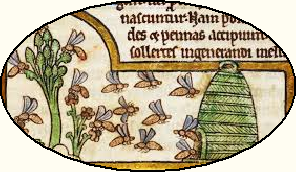Spadina Literary Review — edition 14 page 21
.../
Then there’s pesticides. Winston cites a 2010 study that found traces of 121 different pesticides in beeswax, the bee-made concrete of the honeycomb.
You may have heard of the class of farm pesticides known as neonicitinoids which have been linked to immune system deficiency and ‘memory loss’ in bees. Ortho, the U.S. pesticide maker, just recently announced it will phase these products out for the sake of the bees, while some other manufacturers have yet to be convinced.
Winston feels that “synergies” among multiple minor factors might add up to major implications for bees. A single pesticide at low concentrations might by itself have negligible impact, but combined with other pesticides and/or antibiotics it might interfere with this or that bee hormone or enzyme. As flaws and toxins accumulate in the thousands of worker bees, bit by bit the hive becomes less fit. Then one day a pathogen strikes and, bam! Beemaggedon.
“As we watch honeybee societies collapse we can envision our own demise,” he warns. Like bees, humans are exposed to probably thousands of low-level toxicants not only in our food and drink but also in the air and building materials around us — each compound supposedly at a safe level taken by itself, but, says Winston, we know almost nothing about their combined effects.

Honey and moral guidance
But Bee Time is not a book filled only with gloom, Winston assures us. It turns out he has a lot of other stuff to say about bees, such as some pleasant passages about urban beekeeping, which has grown in popularity in recent years as people feel they should be giving the bees a hand. He is maybe too enthusiastic about brands of artisanal honey made by his beekeeping acquaintances, but at least we learn from him a bit about honey terroir.
Winston also looks briefly at bees in the writing of three poets — Virgil, Yeats, and Plath. Bees seem to represent an ideal of natural serenity. Here’s a sample from Yeats:
I will arise and go now, and go to Innisfree,
And a small cabin build there, of clay and wattles made;
Nine bean-rows will I have there, a hive for the honey-bee,
And live alone in the bee-loud glade.
Several beekeepers testify that in the presence of their bees they experience a calm, Zen-like ability to concentrate on their work. It is this buzzed experience that Winston dubs “bee time.” He considers it “the perfect antidote to our multitasking modern life.”
He likes to portray bees as guides for a way out of our modern ills. He draws morals from the bees, somewhat as medieval bestiaries did.
The bees’ work ethic, their single-minded devotion to the task of the moment, has been admired since antiquity, but apparently the expression “busy as a bee” is hyperbolic: honeybees spend up to 2/3 of their time immobile, just resting, saving themselves up for an emergency. That’s OK, instead of a lesson in busyness, says Winston, they’re giving us a lesson in work-life balance.